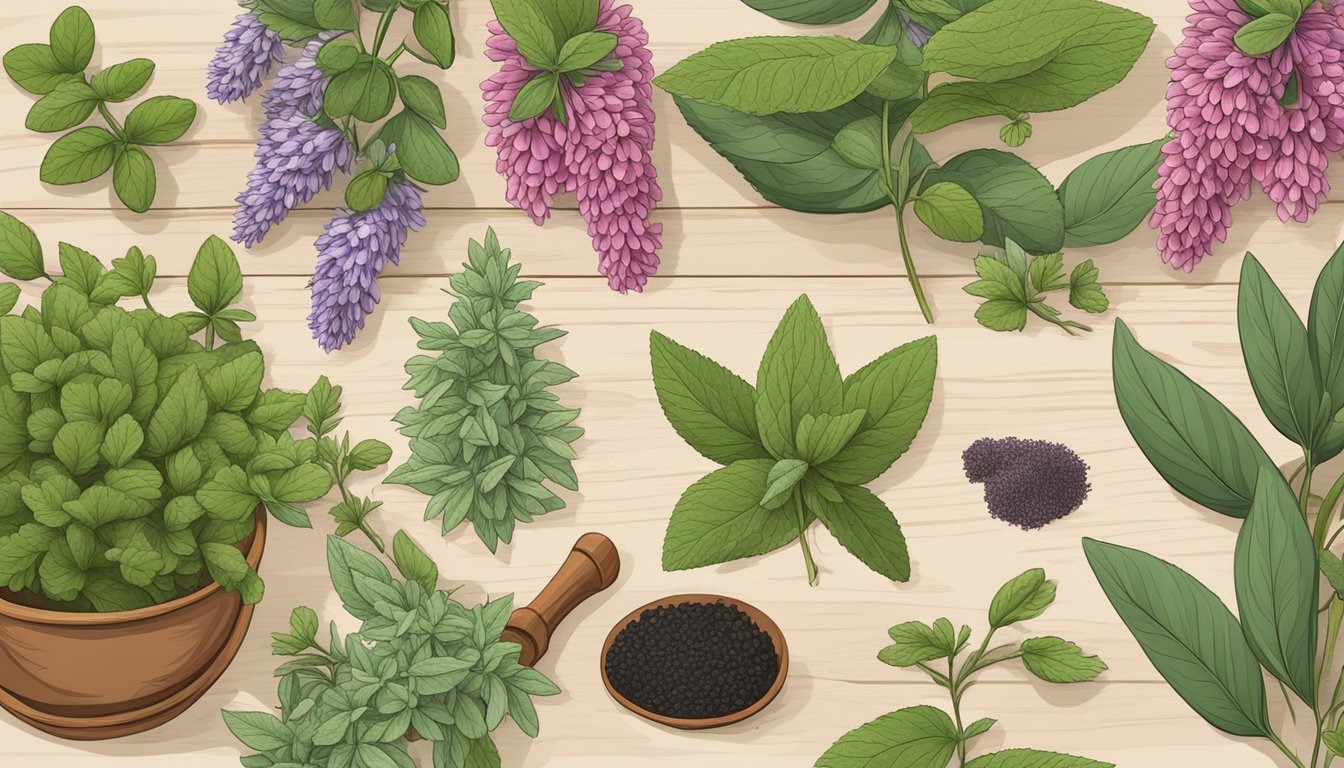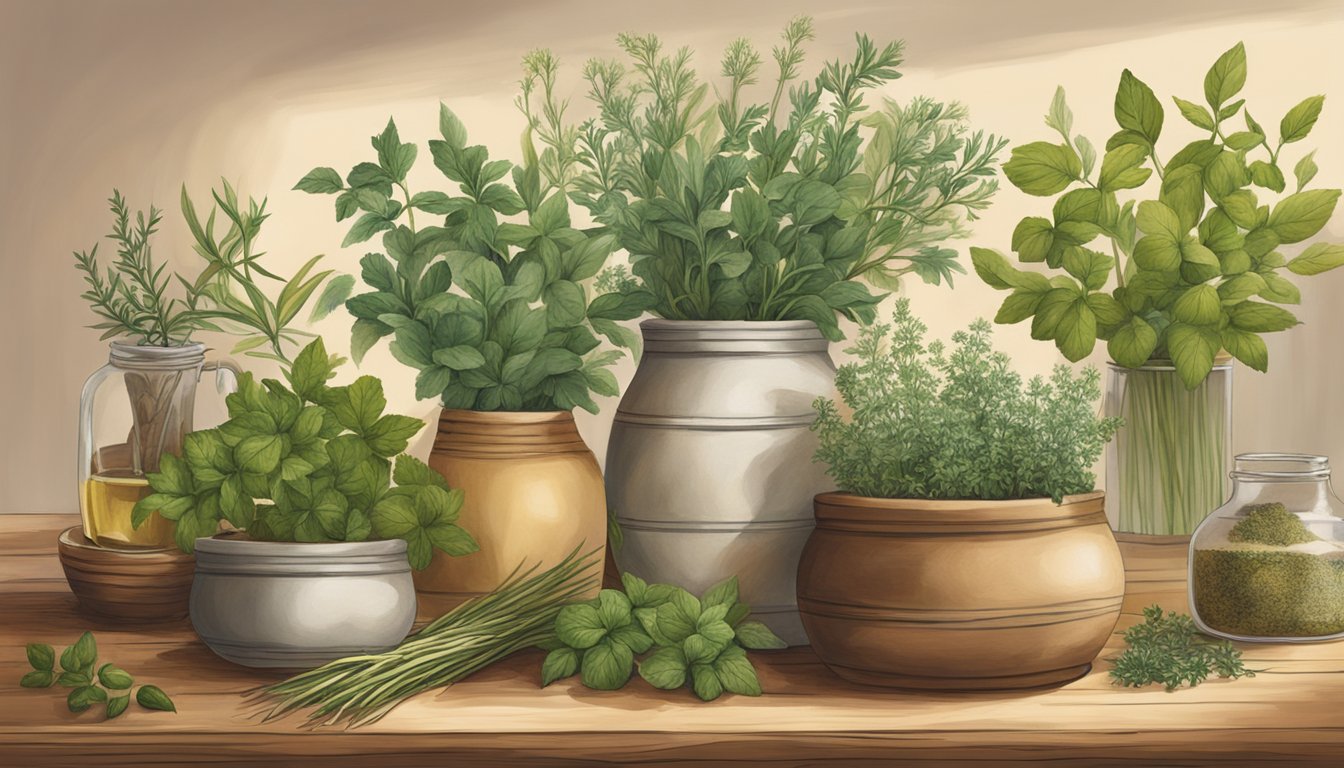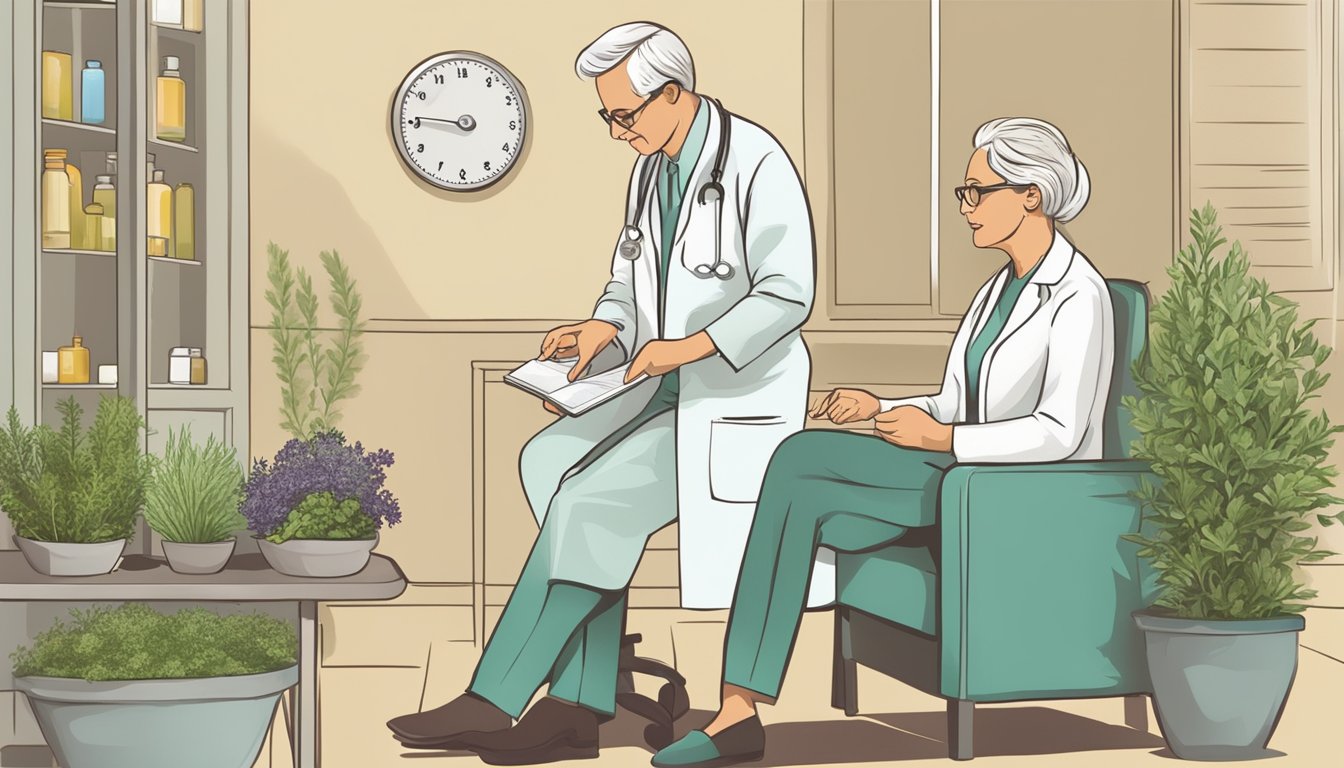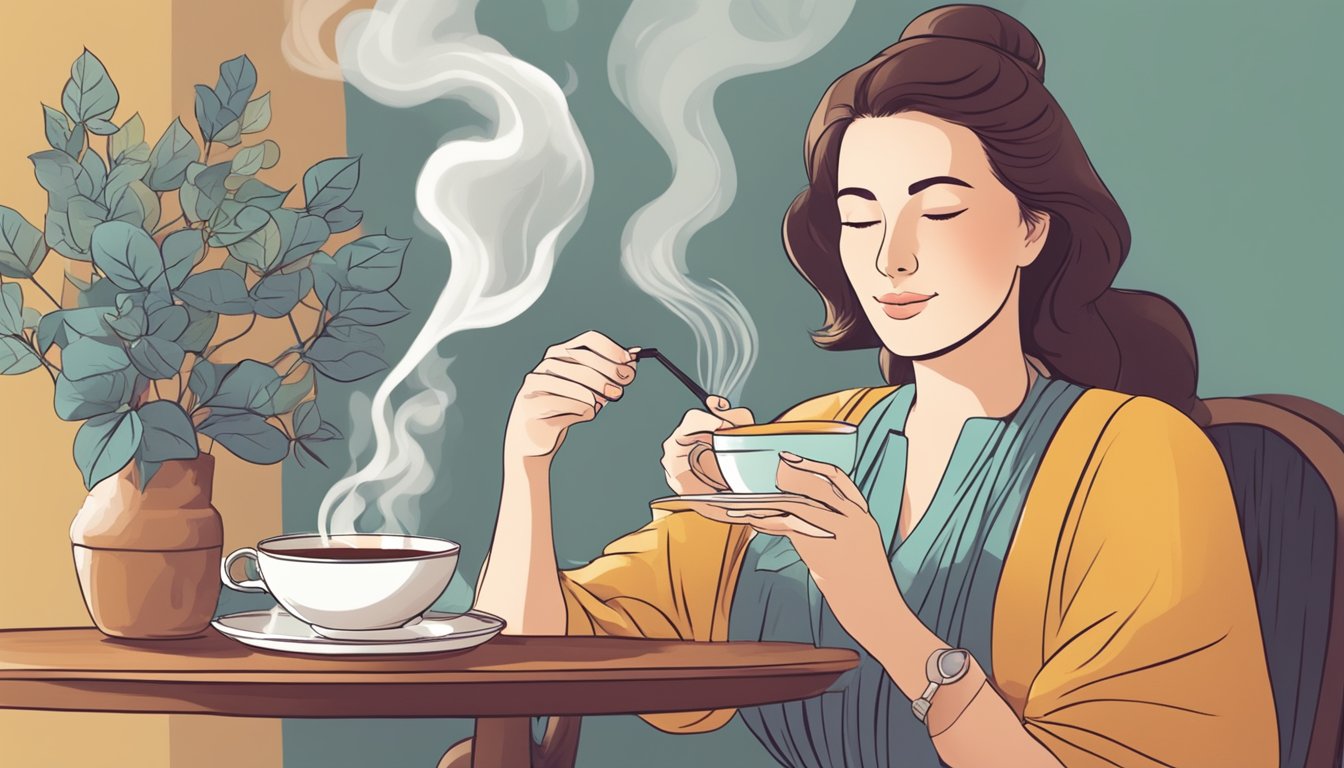TheHerbProf.com is a treasure trove of knowledge for those interested in natural healing and herbal remedies. The website is run by Paul Johnston MD. A naturopathic who has not only received extensive education in the field but also has personal experience in self-healing.
For hundreds of years, herbs have been utilized to address a range of health issues, including symptoms of menopause like hot flashes. Hot flashes, a prevalent symptom of menopause impacting up to 75% of women, are marked by an abrupt sensation of warmth that radiates across the body, coupled with perspiration and skin flushing. But what are the best herb for hot flashes?
While some women experience mild hot flashes, others may experience severe and frequent episodes that can interfere with daily activities. Hormone replacement therapy (HRT) is the most common treatment for hot flashes, but it is not suitable for everyone. Some women prefer to use natural remedies, such as herbs, to manage their symptoms. There are several herbs that have been traditionally used to treat hot flashes, including black cohosh, red clover, and dong quai.
It is important to note that while some herbs may be effective in reducing hot flashes, others may not. Additionally, some herbs may interact with medications or have side effects. It is always advisable to consult with a healthcare provider before taking any herbs or supplements, especially if you have a pre-existing medical condition or are taking medications.
Understanding Hot Flashes
As a woman approaches menopause, she may experience hot flashes, which are sudden sensations of heat that can cause sweating and a rapid heartbeat. They can be mild or severe, and can last for a few seconds to several minutes. In this section, I will discuss the causes of hot flashes during menopause and their common symptoms.
Causes of Hot Flashes during Menopause
Hot flashes are caused by changes in hormone levels, specifically a decrease in estrogen. Estrogen helps regulate body temperature, and when its levels decrease, the hypothalamus (the part of the brain that controls body temperature) can become confused and think that the body is too hot. This can cause the body to try to cool down, resulting in a hot flash.
Other factors that can trigger hot flashes include stress, anxiety, caffeine, alcohol, spicy foods, and smoking. Additionally, hot flashes can be caused by medical conditions such as thyroid problems, diabetes, and certain cancers.
Common Symptoms
The most common symptom of a hot flash is a sudden feeling of warmth or heat that spreads throughout the body, particularly in the face, neck, and chest. This can be accompanied by sweating, a rapid heartbeat, and a flushed appearance. Hot flashes can also cause mood swings, headache, palpitations, irregular periods, vaginal dryness, chills, and weight gain.
Night sweats are another common symptom of hot flashes, which can cause sweating during sleep and disrupt a woman’s sleep cycle. Hot flashes can also cause sexual dysfunction, which can affect a woman’s quality of life.
Hot flashes are a common symptom of menopause that can be caused by a decrease in estrogen levels and other factors. They can cause a range of symptoms, including sweating, mood swings, and weight gain. By understanding the causes and symptoms of hot flashes, women can take steps to manage this common menopausal symptom and improve their quality of life.
Natural Herb for Hot Flashes

As a woman approaches menopause, she may experience hot flashes. These are sudden, intense feelings of heat that can cause sweating and a rapid heartbeat. While some women may not experience hot flashes, others may have them for several years. There are several natural remedies that can help alleviate hot flashes. Here are some of the most popular ones:
Black Cohosh
Black cohosh is a herb that has been used for centuries to treat menopause symptoms, including hot flashes. It contains compounds that mimic estrogen, which can help regulate the body’s temperature. Black cohosh is available in several forms, including capsules, teas, and extracts.
Red Clover
Red clover is another herb that contains compounds that mimic estrogen. It has been shown to reduce the severity and frequency of hot flashes in some women. Red clover is available in several forms, including teas, capsules, and extracts.
Dong Quai
Dong quai is a traditional Chinese herb that has been used for centuries to treat menopause symptoms. It contains compounds that can help regulate the body’s temperature and reduce the severity of hot flashes. Dong quai is available in several forms, including teas, capsules, and extracts.
Evening Primrose Oil
Evening primrose oil is a supplement that contains a fatty acid called gamma-linolenic acid (GLA). GLA has been shown to reduce the severity and frequency of hot flashes in some women. Evening primrose oil is available in several forms, including capsules and extracts.
Maca
Maca is a root vegetable that is native to Peru. It contains compounds that can help regulate the body’s temperature and reduce the severity of hot flashes. Maca is available in several forms, including capsules and extracts.
Soy
Soy contains compounds called phytoestrogens, which can help regulate the body’s temperature. Is available in several forms, including supplements, capsules, and extracts.
Flax Seeds
Flax seeds contain compounds called lignans, which can help regulate the body’s temperature. They are available in several forms, including supplements, capsules, and extracts.
Ginseng
Ginseng is a herb that has been used for centuries to treat a variety of conditions, including menopause symptoms. It contains compounds that can help regulate the body’s temperature and reduce the severity of hot flashes. Ginseng is available in several forms, including teas, capsules, and extracts.
Valerian
Valerian is a herb that has been used for centuries to treat anxiety and insomnia. It can also help reduce the severity of hot flashes. Valerian is available in several forms, including teas, capsules, and extracts.
Chasteberry
Chasteberry is a herb that has been used for centuries to treat menstrual and menopause symptoms. It contains compounds that can help regulate the body’s temperature and reduce the severity of hot flashes. Chasteberry is available in several forms, including teas, capsules, and extracts.
There are several natural remedies that can help alleviate hot flashes. These include black cohosh, red clover, dong quai, evening primrose oil, maca, soy, flax seeds, ginseng, valerian, and chasteberry. While these remedies may not work for everyone, they are a safe and effective alternative to hormone replacement therapy.
Effectiveness of Herb for Hot Flashes

As a researcher in the field of herbal remedies, I have conducted extensive research on the effectiveness of various herbs for treating hot flashes. In this section, I will discuss the evidence-based research on herbs for hot flashes and potential side effects.
Evidence-based Research on Herbs
Black cohosh, soy, dong quai, evening primrose oil, red clover, ginseng, valerian, maca, flax seeds, and chasteberry are some of the most popular herbs used to treat hot flashes. According to the National Center for Complementary and Integrative Health, several studies have been conducted to evaluate the effectiveness of these herbs for hot flashes. However, the evidence is mixed, and more research is needed to determine their effectiveness.
One study found that black cohosh was effective in reducing the frequency and severity of hot flashes. However, other studies have shown conflicting results. Soy is another popular herb used for treating hot flashes. Some studies have found that soy may reduce the frequency and severity of hot flashes, while others have found no significant difference between soy and a placebo.
Red clover is another herb that has been studied for its effectiveness in treating hot flashes. A review of 11 studies found that red clover was more effective than a placebo in alleviating hot flashes. However, the evidence is weak, and more research is needed.
Potential Side Effects
While herbs may be a natural alternative to hormone replacement therapy for treating hot flashes, they are not without risks. Some herbs, such as black cohosh, have been associated with liver damage and should be used with caution in individuals with liver disease. Other herbs, such as red clover, may increase the risk of breast cancer, stroke, and blood clots.
It is important to note that herbs can also have adverse effects when taken in combination with other medications. For example, valerian may increase the effects of sedatives, while ginseng may interact with blood thinners.
While herbs may be a natural alternative to hormone replacement therapy for treating hot flashes, their effectiveness is still uncertain. It is important to speak with a healthcare provider before taking any herbal supplements and to be aware of potential risks and side effects.
Consult Your Doctor for Safe and Effective Treatment

As with any medical condition, it is important to seek the guidance of a healthcare professional before starting any treatment for hot flashes. Consulting with a doctor or other medical professional can help ensure that the treatment is safe and effective for the individual.
Importance of Medical Advice
A healthcare provider can help determine the underlying cause of hot flashes and recommend appropriate treatment options. They can also provide guidance on the safety and quality of herbal supplements, as unregulated supplements may be contaminated or mislabeled. Additionally, a doctor can help prevent the risk of overdose or interactions with other medications.
Risks of Unregulated Herbal Supplements
While some herbal supplements may be effective in reducing hot flashes, it is important to be cautious when using them. Unregulated herbal supplements may not meet safety or quality standards and may contain harmful contaminants. It is important to research the supplement and manufacturer before use and to consult with a healthcare professional.
Alternative Treatment Options
In addition to herbal supplements, there are other alternative treatment options for hot flashes. Lifestyle changes such as diet, exercise, and stress management may be effective in reducing symptoms. Cooling techniques such as fans and avoiding triggers such as caffeine, alcohol, and spicy foods may also be helpful. Other options include hormone therapy, antidepressants such as paroxetine and venlafaxine, gabapentin, clonidine, and alternative therapies such as acupuncture and psychotherapy.
Overall, it is important to consult with a healthcare professional before starting any treatment for hot flashes. They can provide guidance on safe and effective treatment options and help ensure a positive outcome.
Before You Go – Herb for Hot Flashes

Hot flashes can be a challenging symptom to manage during menopause. While there are many conventional treatments available, some women prefer to use herbal remedies to alleviate their symptoms.
Based on my research, some of the most effective herbs for hot flashes include black cohosh, red clover, and dong quai. These herbs contain phytoestrogens that mimic the effects of estrogen in the body, which can help to reduce the severity and frequency of hot flashes.
It is important to note that while herbal remedies can be effective for some women, they may not work for everyone. It is also important to speak with a healthcare provider before using any herbal remedies, as they may interact with other medications or have potential side effects.
Overall, incorporating herbs into a comprehensive approach to managing hot flashes can be a safe and effective option for many women. By working with a healthcare provider and incorporating herbal remedies into a healthy lifestyle, women can find relief from the discomfort of hot flashes and improve their overall quality of life.
Herb for Hot Flashes and The Herb Prof
Hot flashes can be a real bother! But, don’t worry, herbs are here to save the day. They’re nature’s little miracle workers, and they’re just waiting to lend a hand.
Take a stroll over to theherbprof.com. It’s a treasure trove of herbal wisdom. You’ll find a wealth of information on how herbs can help alleviate hot flashes.
Black Cohosh, for instance, is a superstar in the herbal world. It’s been used for centuries to help with menopausal symptoms. It’s like a cool breeze on a hot day!
Red Clover is another gem. It’s rich in isoflavones, compounds that mimic estrogen in the body. It’s like having your own personal thermostat!
And let’s not forget Dong Quai. This herb is a staple in traditional Chinese medicine. It’s like a soothing cup of tea for your hormones.
So, why not give herbs a try? They’re natural, they’re effective, and they’re ready to help. Plus, they’re a great way to support theherbprof.com. It’s a win-win! Check our home page in here!
Remember, herbs and theherbprof.com are a match made in herbal heaven. They complement each other perfectly, like a cup of herbal tea and a good book. So, don’t wait! Start your herbal journey today. Your body will thank you!
References – Herb for Hot Flashes
Little Herb Encyclopedia, by Jack Ritchason; N.D., Woodland Publishing Incorporated, 1995
The Ultimate Healing System, Course Manual, Copyright 1985, Don Lepore
Planetary Herbology, Michael Tierra, C.A., N.D., Lotus Press, 1988
Handbook of Medicinal Herbs, by James A. Duke, Pub. CRP Second Edition 2007
The Complete Medicinal Herbal, by Penelope Ody, Published by Dorling Kindersley
Check the Following Articles!
Top 3 Amazing Options: Herbalife Protein Shake Recipe
Herbalife Baked Goods Recipes: Healthy Lifestyle
Growing Herbs Kit: Starting Your Own Herb Garden
Frequently Asked Questions – Herb for Hot Flashes

What are some natural remedies for hot flashes without hormones?
There are a variety of natural remedies that can help manage hot flashes. Some lifestyle tips that may help include staying cool, dressing in layers, and avoiding triggers such as spicy foods, caffeine, and alcohol. Other alternative therapies that may help include acupuncture, yoga, and relaxation techniques. Plants and supplements such as black cohosh, red clover, and vitamin E may also help manage hot flashes.
What are some herbs that can help with menopause symptoms?
There are several herbs that may help with menopause symptoms, including black cohosh, red clover, and dong quai. Black cohosh has received quite a bit of scientific attention for its possible effects on hot flashes. Studies of its effectiveness in reducing hot flashes have produced mixed results. However, some women report that it has helped them. Red clover contains compounds similar to estrogen and may help reduce hot flashes. Dong quai has been used in traditional Chinese medicine to treat menopause symptoms, but more research is needed to determine its effectiveness.
What is the Chinese herb commonly used for hot flashes?
The Chinese herb commonly used for hot flashes is called dong quai. Dong quai has been used in traditional Chinese medicine for thousands of years to treat a variety of conditions, including menopause symptoms. It is believed to help balance hormones and improve blood flow. However, more research is needed to determine its effectiveness and potential side effects.
What are some potential side effects of black cohosh?
Black cohosh is generally considered safe for most women, but some women may experience side effects such as stomach upset, headache, and rash. It may also interact with certain medications, including blood thinners and hormone therapy. Women with liver disease should avoid black cohosh, as it may cause liver damage.
Can Ashwagandha help with hot flashes?
Ashwagandha is an herb commonly used in Ayurvedic medicine to treat a variety of conditions, but there is limited research on its effectiveness for hot flashes. Some studies suggest that it may help reduce stress and anxiety, which can contribute to hot flashes. However, more research is needed to determine its effectiveness and potential side effects.
What foods can help fight hot flashes?
There are several foods that may help fight hot flashes, including soy, flaxseed, and whole grains. Soy contains compounds called isoflavones, which are similar to estrogen and may help reduce hot flashes. Flaxseed contains lignans, which may also help reduce hot flashes. Whole grains are a good source of fiber, which can help regulate hormones and reduce hot flashes. It’s important to talk to your doctor before making any significant changes to your diet.


